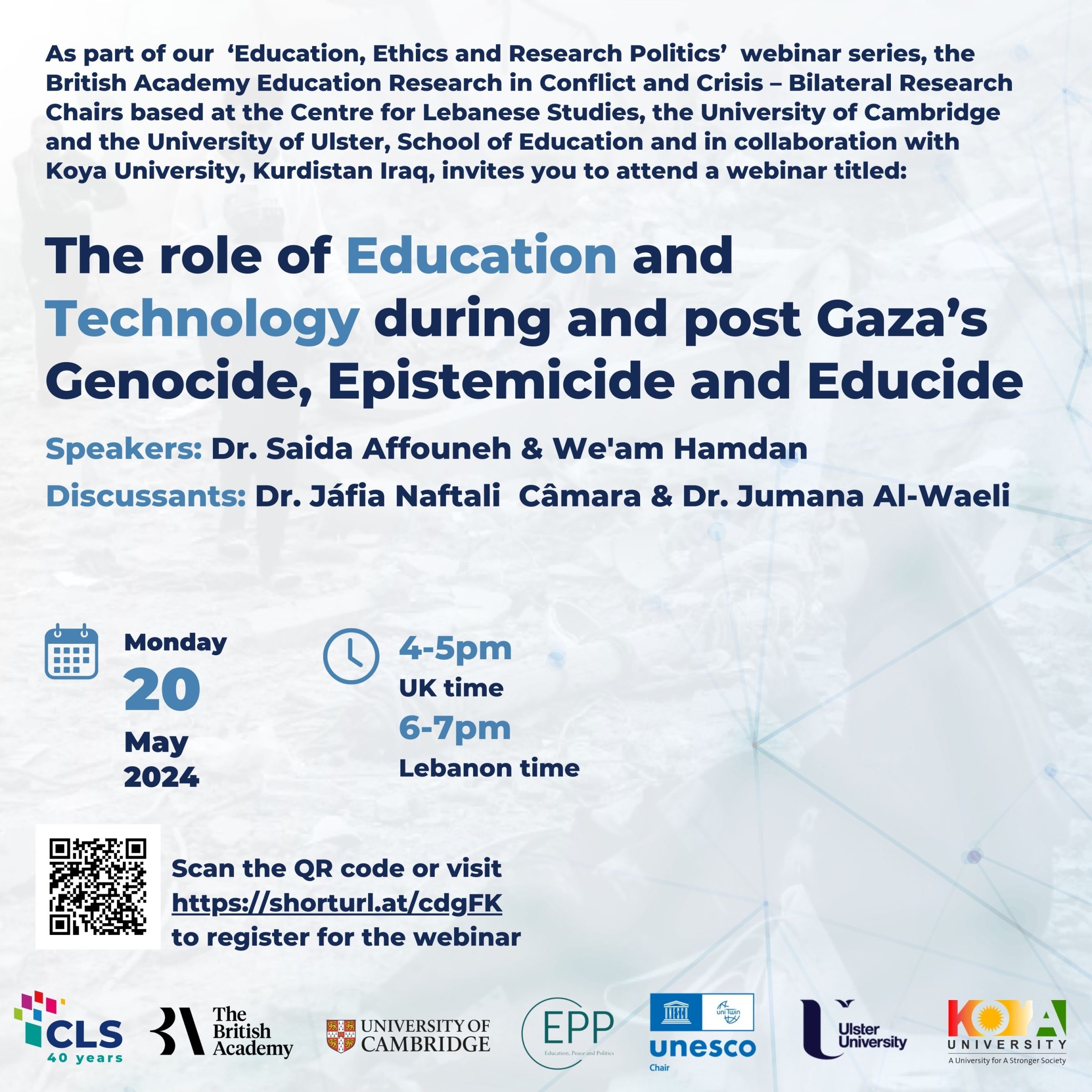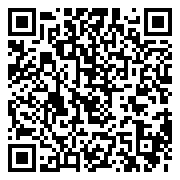
The role of Education and Technology during and post Gaza’s Genocide, Epistemicide and Educide
The British Academy Education Research in Conflict and Crisis – Bilateral Research Chairs based at the Centre for Lebanese Studies and University of Cambridge and at the University of Ulster, School of Education in collaboration with Koya University, Kurdistan Iraq, invite you to attend our 2nd webinar as part of our webinar series, Education, Ethics and Research Politics (EERP), at 4 to 5 pm UK time/ 6 to 7 pm Lebanon time on 20th May 2024.
The role of Education and Technology during and post Gaza’s Genocide, Epistemicide and Educide
Please register in advance for this webinar here:
https://us06web.zoom.us/webinar/register/WN_5II0vbBkQgedAdlGv2L_SA
Dr Saida Affouneh, An-Najah National University, Palestine and We’am Hamdan, a 2nd year PhD student at the Faculty of Education, Cambridge University, will discuss education in Palestine before and during the genocide on Gaza, the increased violence by the occupation in Palestine, and the considerations for the future of education in Palestine, including aid cuts to UNRWA and its impact on education in Palestine and on Palestinians’ education who depend on UNRWA schools elsewhere. How do the speakers envision education in Gaza in the context of genocide? What role can technology play in shaping both current and future education? Considering the destruction of educational institutions and the loss of lives among educators, scholars, and students, what interventions can be implemented to support students in Gaza? How can we forge collaborations and use technology to help?
Dr Saida Affouneh: Innovative solutions to Recover Education in Palestine during the genocide
This presentation is going to discuss the situation of education in Palestine: exploring its historical context, current challenges, and future prospects. Due to more than 75 years of occupation, the education system has been facing a continuous attack and many children have lost their fundamental right to access quality education and opportunities, despite the fact that Palestinians value their education and consider it as the only tool for a better life. Through the presentation, different types of initiatives including technological initiatives, projects and resilience models will be discussed. There will be a particular focus on the ongoing challenges faced by universities and schools in Gaza, highlighting the concerning trend of ‘Educide’. Content analysis will be presented of the recent situation of schools and higher education reports, numbers and indicators will also be presented. Innovative solutions aimed at recovering and revitalising education in this turbulent context will be discussed. This will include examining creative initiatives, projects, and models designed to mitigate the impact of conflict on education and highlighting promising pathways forward. The presentation emphasises the urgent need for innovative approaches including technological approaches to safeguard education and empower Palestinian learners amidst profound adversity.
We’am Hamdan: The political economy of education technology: between the past and the present.
This presentation explores the complex role of technology during the genocide in Gaza, examining its deployment within the broader framework of Israeli settler colonialism. Drawing from my research, as outlined in a recent book chapter on the political economy of education and technology, I critically assess how digital tools are employed both as mechanisms of control and as instruments of Palestinian resistance. Throughout the discussion, I will reflect on the profound ethical questions I encountered as a researcher, particularly as I extend this work into my PhD study. The presentation also explores the forms and techniques of coloniality, highlighting specific sites where Palestinian resistance is evident. By engaging with these themes, the presentation invites the audience to consider practical ways in which global solidarity can be transformed into meaningful action to support and amplify these acts of resistance.
Dr Saida Affouneh, Deputy president for online learning and digitalization at An Najah National University in the West Bank, Leader of TESI Initiative. Dr Affouneh is a widely published academic and works on digital and e-learning in times of crisis and occupation.
We’am Hamdan is a PhD student at the Faculty of Education, Cambridge University, where her research focuses on the transitional experiences of ICT workers from higher education to employment in the Palestinian context. She holds a background as a teacher and educator in Palestine. We’am has also contributed to the anthology “Resisting Domination in Palestine,” which examines Israeli control mechanisms and Palestinian resistance. Her chapter specifically explores the role of education technology in these dynamics, analyzing both the methods of control and the strategies employed by Palestinians to resist such domination.
The EERP series has been created by Research Fellows Dr.Jáfia Câmara and Dr. Jumana Al-Waeli with the aim of fostering dialogue, learning and collaboration.
Dr. Jáfia Naftali Câmara is a British Academy Research Fellow at the Centre for Lebanese Studies, Faculty of Education, University of Cambridge. She holds a PhD in Education from the University of Bristol.
Dr. Jumana Al-Waeli is a Postdoctoral Research Fellow at Ulster University’s School of Education, and a Research Fellow of the Education, Peace and Politics network. She studied for her PhD at the department of Curriculum, Pedagogy and Assessment at UCL’S faculty of Education and Society (IOE).

